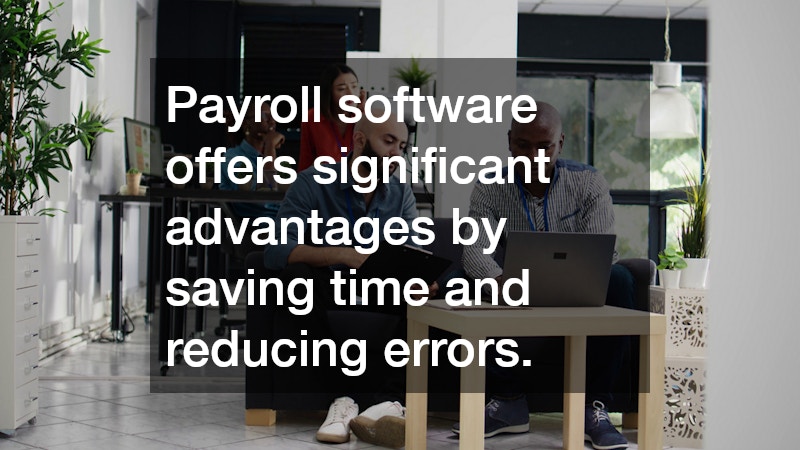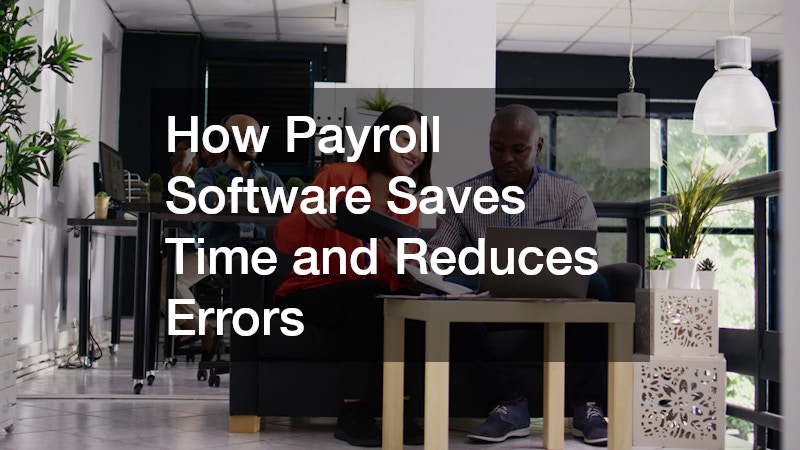In this fast-paced world, businesses are continuously looking for ways to streamline their operations. Payroll software offers a valuable solution by saving time and reducing errors. This article will explore the key benefits and address common questions about payroll software.
What Are the Time-Saving Benefits of Payroll Software?
Automated Calculations
Payroll software automates the calculation of wages, taxes, and deductions, drastically reducing the time needed for manual payroll processing. Businesses can allocate the saved time to more strategic tasks, enhancing overall productivity.
By minimizing the manual computations associated with payroll, companies can significantly reduce the payroll cycle time. This efficiency not only benefits the organization internally but also increases employee satisfaction by ensuring timely payments.
Automation supports accuracy and reliability, which are crucial for maintaining trust and transparency within the organization. It demonstrates the company’s commitment to leveraging technology that enhances operational efficiency.
Quick Reporting and Access to Information
With payroll software, users can quickly generate reports and access historical payroll data, saving valuable time in data retrieval and decision-making processes. This feature supports strategic planning by providing managers with crucial insights into labor costs and trends.
Access to detailed reports facilitates informed decision-making, allowing companies to adapt to changing business environments. This responsiveness can help businesses maintain competitive advantages and quickly adjust to fiscal demands.
Furthermore, the ease of accessing past data supports compliance audits and financial planning. These capabilities ensure that organizations remain accountable and sustainable over the long term.
How Does Payroll Software Reduce Errors?
Elimination of Manual Data Entry
Payroll software minimizes human error by reducing reliance on manual data entry, ensuring more accurate payroll calculations. This reduction in human intervention decreases the risk of costly mistakes that can affect both employees and the business.
Automated payroll processes ensure consistency and standardization across pay cycles, promoting accuracy. These efficiencies allow companies to build a reliable payroll system that employees can depend on.
Furthermore, reducing manual tasks lessens the administrative burden on human resources teams, freeing them to focus on more value-added activities. This strategic shift can enhance employee engagement and operational excellence.
Automated Compliance Updates
Regular compliance updates help organizations adhere to the latest tax laws and regulations automatically, reducing the risk of costly penalties due to errors. Payroll software keeps pace with legislation changes, ensuring that businesses meet their legal obligations.
Automated updates also alleviate the need for extensive manual tracking of regulatory changes, reducing administrative overheads. This focus on compliance not only safeguards the organization but also demonstrates corporate responsibility and governance.
Proactive compliance management fosters trust and stability within the organization and with external stakeholders. By employing software that keeps compliance at the forefront, companies can mitigate risks and embrace opportunities confidently.
Is Payroll Software Cost-Effective for Small Businesses?
Long-term Cost Savings
Although there is an initial investment, payroll software can result in long-term savings by reducing the need for extensive human resources and minimizing errors that lead to financial penalties. These financial efficiencies are especially critical for small businesses that operate with limited resources.
The return on investment extends beyond direct savings, offering indirect benefits such as improved employee morale through efficient payroll processing. This morale boost can translate into increased productivity and loyalty, providing further economic advantages.
Investing in payroll software is a strategic decision that aligns with the broader goals of financial management and organizational growth. By prioritizing such investments, small businesses can position themselves for future success.
Scalable Solutions
Many payroll software solutions offer scalable pricing models, allowing small businesses to choose functionalities and plans that fit their specific needs without incurring unnecessary costs. This flexibility enables smaller enterprises to grow confidently, knowing that their payroll system can adapt with them.
Scalable solutions ensure that businesses remain agile and responsive, maintaining cost-effectiveness as organizational needs change. This adaptability is essential for staying competitive in fluctuating economic conditions.
Investing in a scalable system empowers businesses to innovate and explore new opportunities without the constraints of an inflexible traditional payroll process. This adaptability supports long-term stability and profitability.
Payroll software offers significant advantages by saving time and reducing errors, making it an essential tool for businesses of all sizes. Understanding its benefits and addressing common queries allows organizations to make informed decisions and optimize their payroll processes efficiently.
As businesses continue to prioritize efficiency and accuracy, the integration of advanced payroll solutions presents a strategic asset. Embracing these tools can facilitate enhanced operational performance and growth.
With ongoing advancements in technology, payroll systems will continue to evolve, offering even greater value. By staying abreast of these developments, businesses can ensure they remain competitive and compliant in an ever-changing landscape.



